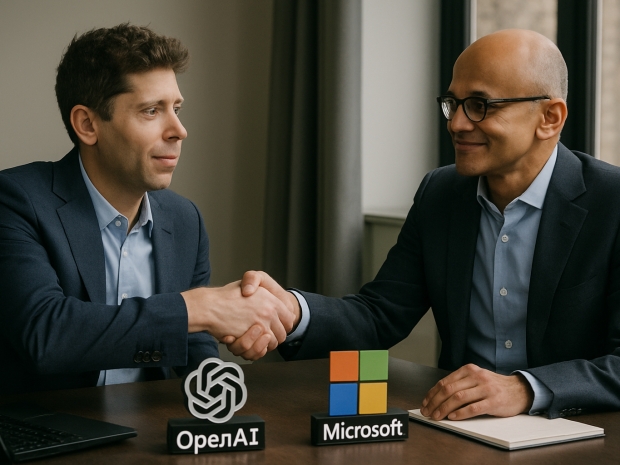Vole is OpenAI’s biggest sugar daddy and is not thrilled about the $260 billion start-up’s plan to finish its slow-motion divorce from its non-profit past, even if OpenAI still mumbles about “benefitting humanity.”
Three people with direct knowledge of the talks said Vole is offering to give up some of its equity stake in OpenAI’s new for-profit business in exchange for accessing new technology developed beyond the 2030 cutoff. Sources say the pair are also haggling over the original 2019 deal, which saw Redmond’s finest chuck $1 billion into OpenAI’s pot in exchange for access to models, products, and a share of the spoils until 2030.
The outcome is make-or-break for OpenAI’s revamp and the future of large language models, which are currently freaking out half the industries on the planet.
OpenAI chief executive Sam Altman, in a lunch interview with the Financial Times, claimed he’s chasing “genius-level intelligence” that will make humans look like muppets.
Last week OpenAI dropped a move that would have handed total control to its non-profit board but clung to the idea of spinning its money-making arm into a “public benefit corporation” — an outfit that promises to care about humanity while chasing giant piles of cash.
The public benefit corporation model, already adopted by rivals like Anthropic and Elon Musk’s xAI, lets OpenAI dish out equity to investors. A company source said it’s a key tweak that would make an “IPO possible.”
Even so, talks are messy. Multiple sources say Vole and OpenAI are still close, with Microsoft stuffing its software with OpenAI’s AI magic and pumping in computing grunt. But OpenAI’s dreams of global domination have turned it into a rival as much as a friend.
One senior Redmond staffer said: “The friction comes partly due to style. OpenAI says to Microsoft ‘gives us money and compute and stay out of the way: be happy to be on the ride with us.’ So naturally this leads to tensions. To be honest, that is a bad partner attitude, it shows arrogance.”
A source near OpenAI insisted: “Microsoft still wants this conversion to succeed. It’s not like it’s all gone to hell and it’s open warfare. There’s a tough negotiation but we’re confident we’ll get it done.”
OpenAI, originally a 2015 brainchild of Altman, Musk, and a few other nerds, began as a non-profit before inviting outside investors into a capped-profit subsidiary in 2019. At the time, OpenAI told Vole and other backers to think of their cash as more charity than investment. That pitch did not age well.
By October 2024, OpenAI had suckered $6.6 billion from SoftBank (about €6.1 billion), Thrive Capital, and Altimeter Capital. In March 2025, it lured another $40 billion (around €37 billion) mostly from SoftBank. Investor contracts spell out exactly how much equity each backer nabs when OpenAI pulls off its corporate shape-shifting trick. If it bottles it, the investors can yank back their cash.
One insider admitted that raising “$40bn under a capped profit structure is not achievable” and said the new structure is a blunt acknowledgment of reality.
Even if OpenAI stitches up a deal with Microsoft, the drama isn’t over. OpenAI is now promising to hand its non-profit board a fat chunk of shares and let them pick some directors, in a last-ditch effort to prove it still cares about public good.
Critics are not convinced. Elon Musk who threw his toys out of the pram years ago, is suing to torpedo the restructure. His lawyer Marc Toberoff fumed: “The charity is still turning over its assets and technology to private persons for private gain — including Sam Altman — while moving all of the charity’s actual work on AI/AGI into a giant for-profit corporation.”
Former OpenAI staffer Page Hedley piled in, warning that the changes would siphon “extraordinary wealth and power” away from the public and into investors’ back pockets.
OpenAI must charm regulators in California and Delaware, who could kill off the restructuring if they decide it sells out the public mission. Delaware attorney-general Kathy Jennings said she would be “reviewing” OpenAI’s scheme to check whether it still serves the common good.
If the plan flops, OpenAI will struggle to raise another truckload of cash, list on the stock exchange, or fight off Big Tech monsters like Google.
Columbia Law School professor Dorothy Lund said: “When you’re a mission-driven company which needs money from investors, you are in a dangerous position. You have to walk this line: you want your investors to keep giving you huge billion-dollar cheques, so you need to keep them happy.”
-




